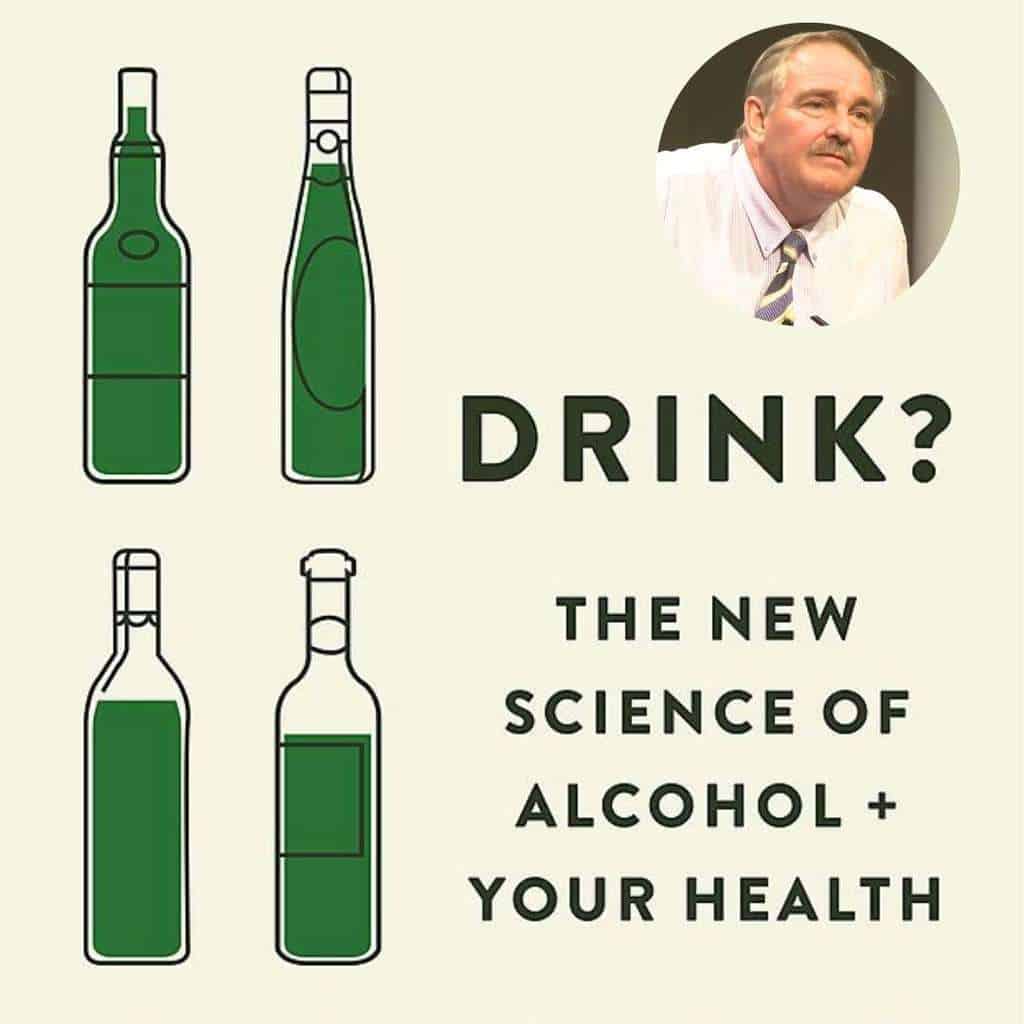
This website uses cookies to improve your experience. We'll assume you're ok with this, but you can opt-out if you wish. Read More
The Next Round: What happens after you change your drinking?

The author of Drink?, professor David Nutt, is director of the Neuropsychopharmacology Unit in the Division of Brain Sciences at Imperial College London.
He has a long career researching the impacts of drugs including alcohol. Professor Nutt is perhaps best known as Chair of the UK Government’s Advisory Committee on the Misuse of Drugs. He was dismissed from this role, as the Government didn’t like his considered scientific advice on harm reduction. In particular, his note that horse riding is more dangerous to health than taking ecstasy was deemed too controversial. But it is a statement well supported by official statistics.
So Professor Nutt both knows what he’s talking about, and isn’t afraid to say it. And Drink? is a very good book for anyone interested in what alcohol does to us, both mentally and physically, in both good and bad ways. This book is most definitely not “quit lit” in the usual sense. But it is very much worth reading if you are considering the role alcohol plays in your life. It will give you the best possible reliable scientific information you need when you decide on your future drinking habits.
The majority of the book’s chapters cover different aspects of alcohol’s impact on the human body and mind. There were many fascinating pieces of information even for someone like me who has been involved with Club Soda for several years.
The first chapter covers the basics of what happens when we drink alcohol: from the initial reactions to the hangovers the following day. And science here confirms one urban legend – some drinks do really seem to lead to worse hangovers. For example whisky, brandy and wine contain chemicals that make us feel worse than other types of tipples.
In Chapter 2 the author discusses the health harms. A table shows the different lengths of time different levels of drinking will shorten your life expectancy. You can also compare these years with those lost by other unhealthy behaviours. The impact of a bottle of wine every day is roughly equivalent to smoking 20 cigarettes a day. Both lead to a life seven to eight years shorter than without them.
The chapter on hormones and fertility has an interesting note about women’s drinking habits. It says that the “hormonal fluctuation of the perimenopause years” is the reason many women’s relationship with alcohol changes at that time in their lives. Either they can no longer tolerate alcohol, or want to drink more of it.
A chapter on quality of life lists some possible positive effects of drinking, such as increased creativity and confidence, and help with shakes and tremors due to stress and some medical conditions. At least some evidence exists showing that alcohol does help with these. A short section lists some social benefits of booze as well.
A long chapter covers addiction: what it is, how it develops, detoxing, and a variety of possible treatments, both medical and psychological.
Using any drug, including alcohol, over long periods of time alters our brains, and these changes then make it very difficult to stop using the drug. And alcohol is far from a harmless drug to use. An estimated 40% of heroin users become addicted to it – for alcohol the rate is between 10% and 15%.
There is no such thing as an addictive personality, according to the book. But some people are more vulnerable to becoming addicted. Men are three times more likely than women to show signs of alcohol dependence in the UK. Similarly, the question whether addiction is genetic has been a subject of much study. The current understanding is that addiction is not “in your genes” as such, but the propensity to become addicted is. This is due to traits that will make you more likely to drink too much, for example impulsivity or predisposition to stress and anxiety.
There are some danger signs on the way to addiction. These include using alcohol to overcome stress or anxiety and dealing with negative emotions. Drinking on most days, and getting huge pleasure or a “buzz” from drinking are also worth noticing.
With all the facts now available to us, the book comes to David Nutt’s key point. That is helping us to get “the maximum benefit out of drinking, with the least amount of harm” – assuming of course that you want to drink at all. You may of course decide that going alcohol-free is the right choice for you. The book does also give you some pointers on when that might be a good option.
This section starts with an exercise to think about the type of drinker you are: social, fitting in, looking for excitement, or coping/self-medicating. The next recommendation is to keep a drinking diary for a month.
The following pages provide many good useful and practical tips on cutting down. Club Soda events get a mention too, as a way of meeting people in a non-drinking context!
Other chapters of the book cover “AAA: alcohol, accidents and aggression”, mental health, and children and alcohol. The final section discusses the social problems caused by excessive drinking, and what could be done about them.
Overall, we can highly recommend this book to anyone who drinks. We wholeheartedly agree with Professor Nutt’s message that if you drink, you should do it with full knowledge of the facts. Only then can you make the right choice for yourself, whether that is to go alcohol-free or to drink in moderation. And when you decide to drink, at least you have taken a calculated risk knowing what the harms are.
If you are interested in David Nutt’s views on illicit drugs, his earlier book Drugs without the hot air: Making Sense of Legal and Illegal Drugs is also good reading. Find it on Amazon UK, on Amazon US, and on Amazon AUS.
This website uses cookies to improve your experience. We'll assume you're ok with this, but you can opt-out if you wish. Read More
| Name | Domain | Purpose | Expiry | Type |
|---|---|---|---|---|
| wpl_user_preference | joinclubsoda.com | WP GDPR Cookie Consent Preferences. | 1 year | HTTP |
| PHPSESSID | www.tickettailor.com | PHP generic session cookie. | 55 years | HTTP |
| AWSALB | www.tickettailor.com | Amazon Web Services Load Balancer cookie. | 7 days | HTTP |
| YSC | youtube.com | YouTube session cookie. | 55 years | HTTP |
| Name | Domain | Purpose | Expiry | Type |
|---|---|---|---|---|
| VISITOR_INFO1_LIVE | youtube.com | YouTube cookie. | 6 months | HTTP |
| Name | Domain | Purpose | Expiry | Type |
|---|---|---|---|---|
| _ga | joinclubsoda.com | Google Universal Analytics long-time unique user tracking identifier. | 2 years | HTTP |
| sbjs_migrations | joinclubsoda.com | Sourcebuster tracking cookie | 55 years | HTTP |
| sbjs_current_add | joinclubsoda.com | Sourcebuster tracking cookie | 55 years | HTTP |
| sbjs_first_add | joinclubsoda.com | Sourcebuster tracking cookie | 55 years | HTTP |
| sbjs_current | joinclubsoda.com | Sourcebuster tracking cookie | 55 years | HTTP |
| sbjs_first | joinclubsoda.com | Sourcebuster tracking cookie | 55 years | HTTP |
| sbjs_udata | joinclubsoda.com | Sourcebuster tracking cookie | 55 years | HTTP |
| sbjs_session | joinclubsoda.com | SourceBuster Tracking session | Session | HTTP |
| Name | Domain | Purpose | Expiry | Type |
|---|---|---|---|---|
| mailchimp_landing_site | joinclubsoda.com | Mailchimp functional cookie | 28 days | HTTP |
| __cf_bm | tickettailor.com | Generic CloudFlare functional cookie. | Session | HTTP |
| NID | google.com | Google unique id for preferences. | 6 months | HTTP |
| Name | Domain | Purpose | Expiry | Type |
|---|---|---|---|---|
| _ga_10XZMT03ZM | joinclubsoda.com | --- | 2 years | --- |
| AWSALBCORS | www.tickettailor.com | --- | 7 days | --- |
| cf_clearance | tickettailor.com | --- | 1 year | --- |
| VISITOR_PRIVACY_METADATA | youtube.com | --- | 6 months | --- |
Join Club Soda for 10% off your first order of drinks for UK delivery. Plus get our latest news and special offers for members to choose better drinks, change your drinking and connect with others.
If you get an error message with this form, you can also sign up at eepurl.com/dl5hPn